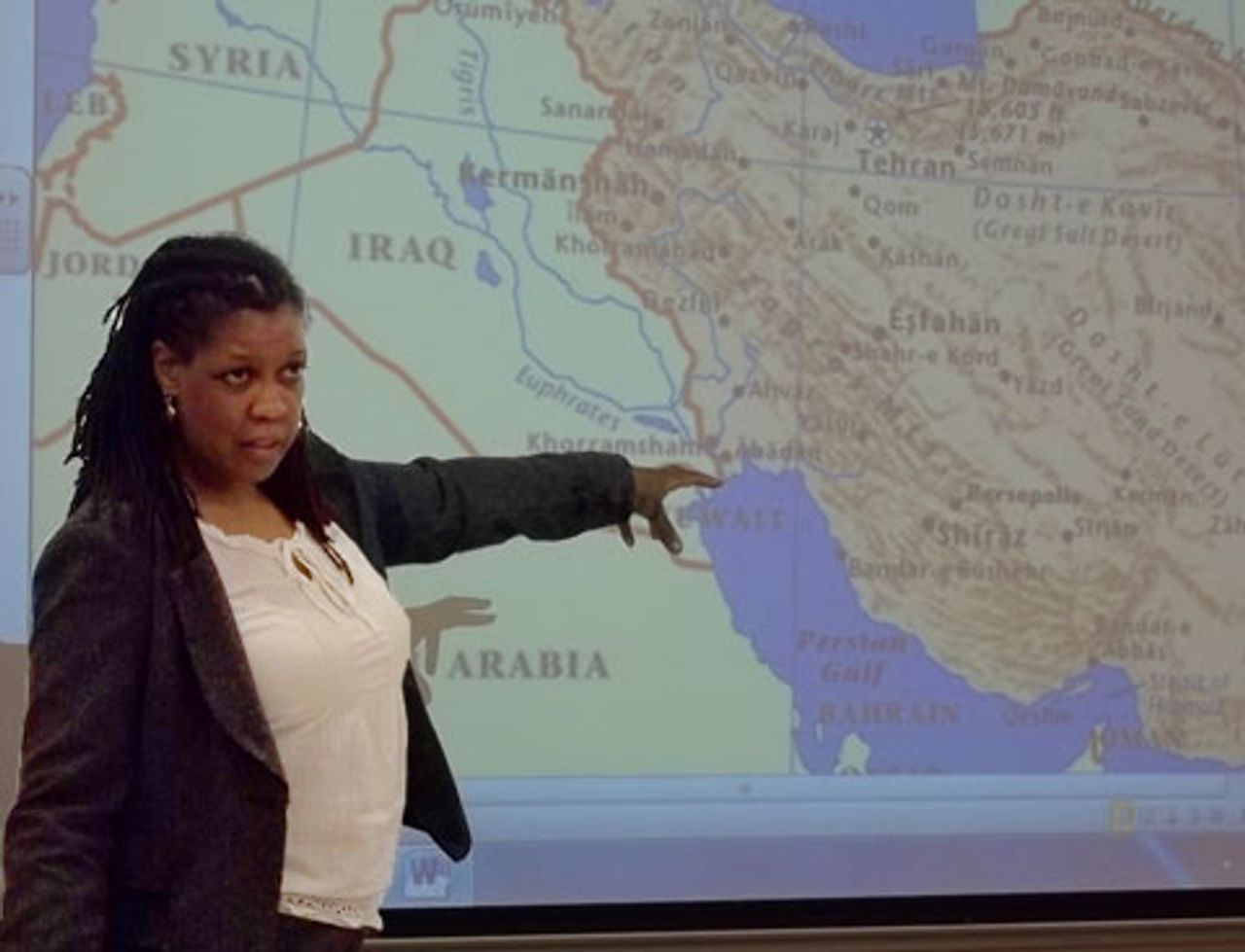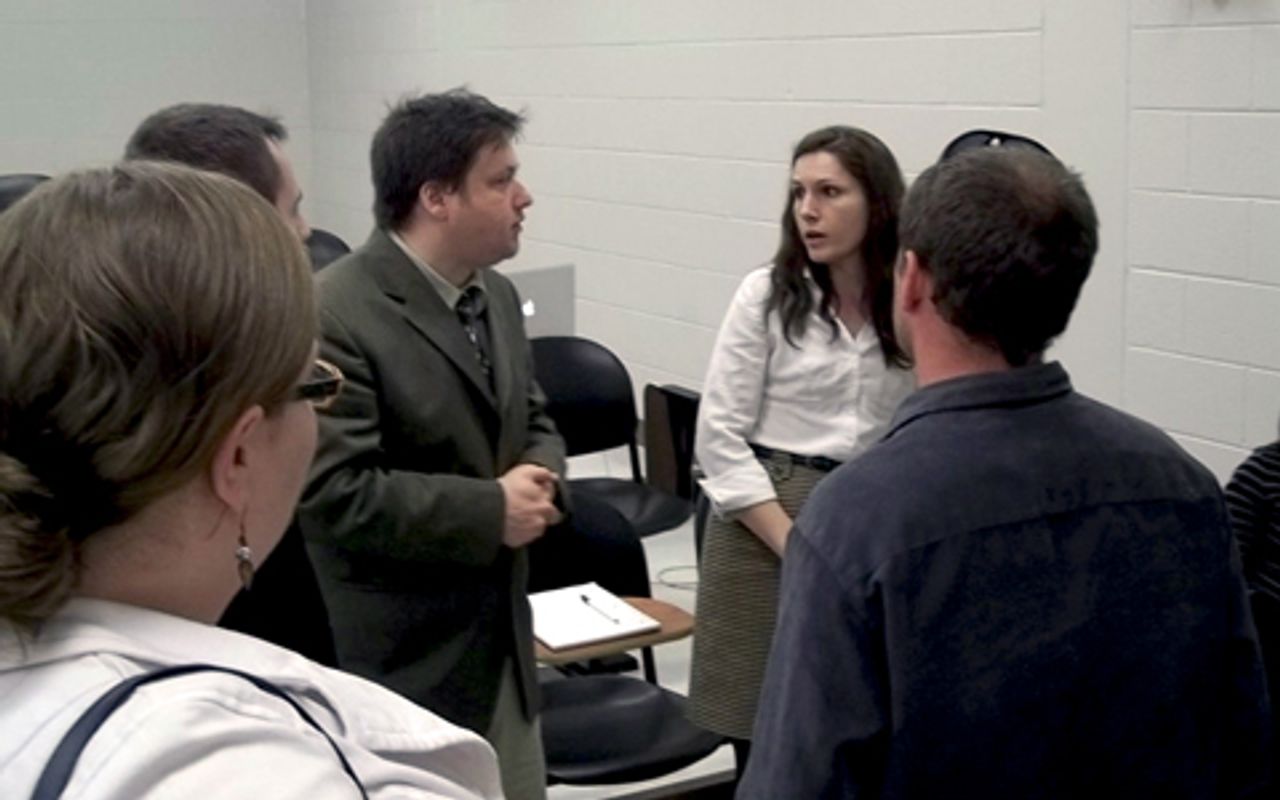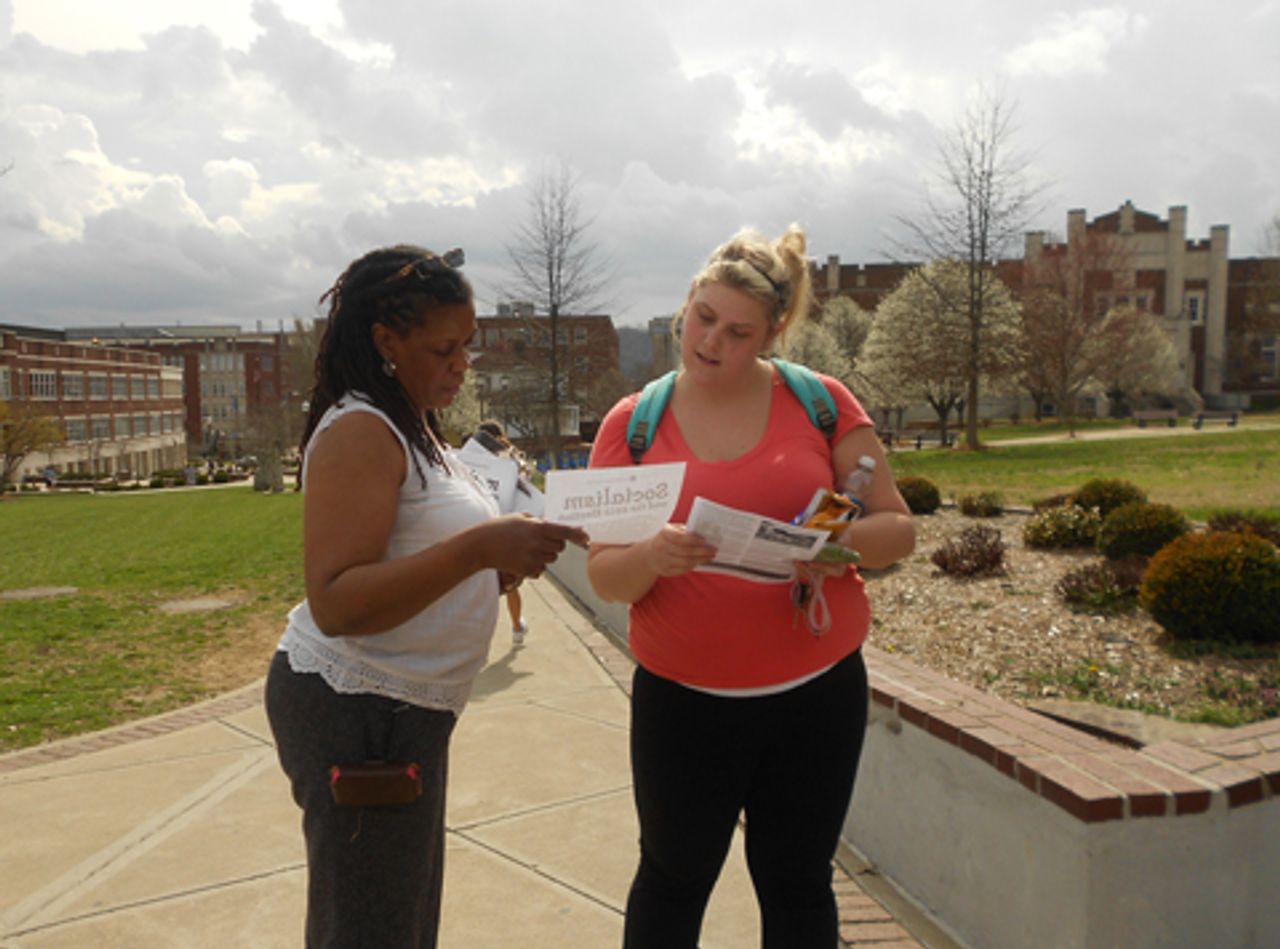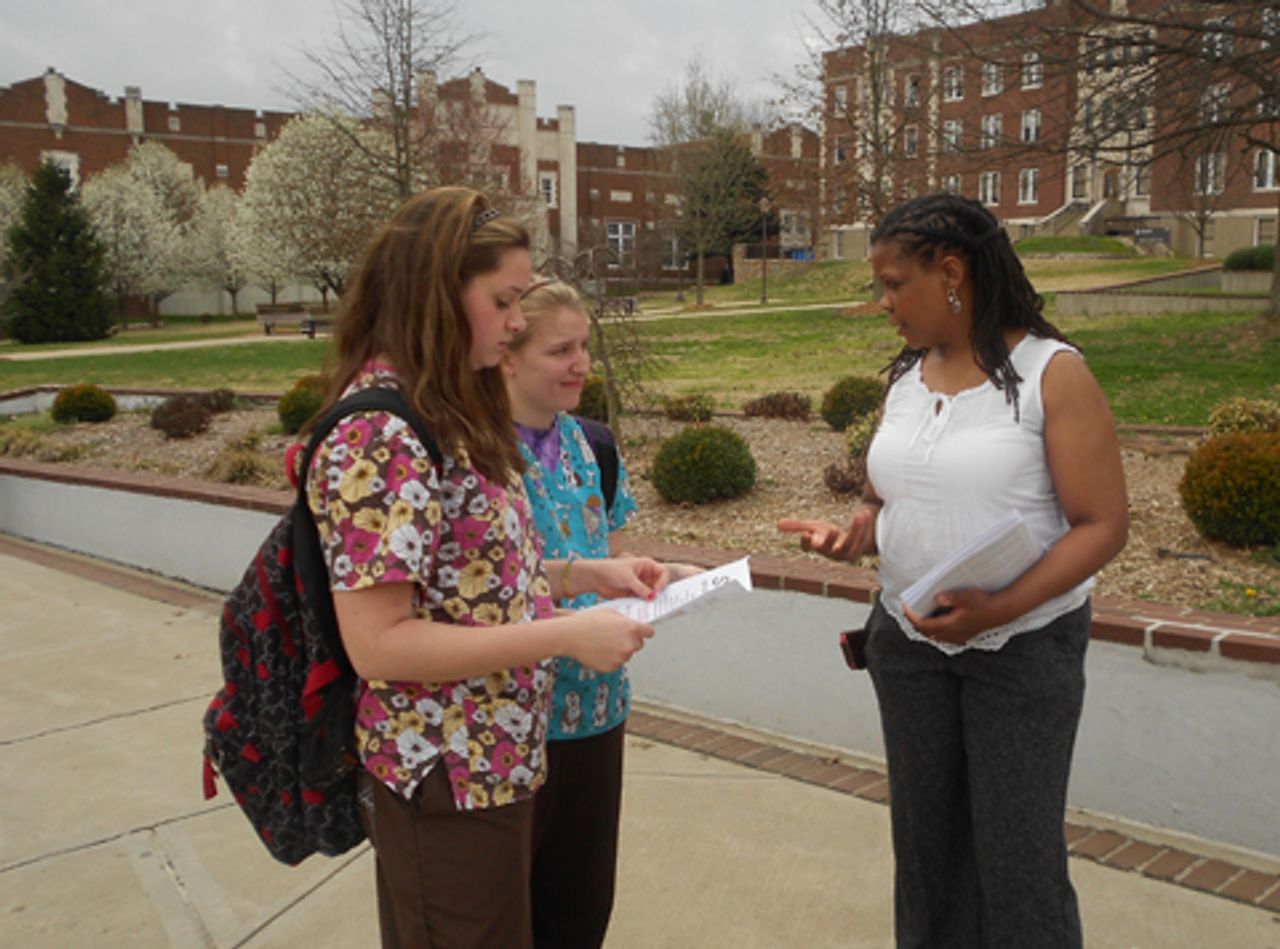Phyllis Scherrer, the Socialist Equality Party candidate for vice president, spoke at a public meeting held at Morehead State University in Kentucky on Thursday. The meeting was well attended by students and workers in the area.
 Phyllis Scherrer
Phyllis ScherrerMembers of the Morehead State chapter of the International Students for Social Equality and its newly formed election committee had been speaking to workers and students in Morehead as well as in Lexington, Kentucky and Huntington, West Virginia for weeks to promote the event.
The meeting was held despite efforts by the university administration to shut it down. The evening before the event, the ISSE received an email from the events coordinator stating that, after discussion with Dean of Students Kevin Koett, the decision had been made to cancel the club’s meeting room reservation. The claim was made that the event was a “campaign rally” and had to be moved to the “Free Speech Area” of the campus. Given the projections of bad weather, this would have effectively forced the cancellation of the event.
The ISSE rejected this decision as a politically motivated act intended to censor the group on campus and undermine free speech on the campus. Koett eventually relented—but insisted that the ISSE had to pay a $100 fee.
Thursday evening’s meeting was attended by 15 students and workers. After the intervention of the dean, several professors informed their classes that the event was cancelled, reducing attendance. When the ISSE was finally able to regain access to the meeting room, there was little time to correct misinformation.
Scherrer opened Thursday’s meeting with a moment of silence for the victims of the tornado disaster that struck eastern Kentucky earlier this month. Scherrer had previously issued a statement, “The tornado disaster and the case for socialist planning,” in which she addressed the social component of this natural disaster.
Scherrer began her talk by discussing the unreal character of official politics and the election campaigns run by both the Democrats and Republicans. “The Socialist Equality Party is running in the presidential election,” she said, “to provide the working class with an alternative to the policies of austerity, attacks on democratic rights and militarism being advanced by the two corporate-backed parties.”
Scherrer spoke on a range of important issues. She discussed the speech by US Attorney General Eric Holder at Northwestern University, in which he provided a pseudo-legal defense of the Obama administration’s policy of extra-judicial assassination of US citizens.
Scherrer also spoke on the drive to war with Syria and Iran and its roots in the capitalist system. “What we have is the ripping apart of the planet and the parceling out of resources among rival nation states just as in earlier wars, except this is an age of nuclear-armed governments.” She added, “The greatest danger to humanity today is the effort by American capitalism to reverse its historic economic decline through war.”
Scherrer spoke about the enormous gulf separating the financial elite and the majority of the US population. “In the US, three and a half years after the 2008 crash, the stock market has fully recovered and corporate profits have reached the highest proportion of the GDP since 1929. At the same time, the portion of the national income shared by labor has reached its lowest level since 1929.”
In discussing Obama’s efforts to make the brutal restructuring of the US auto industry at the expense of the working class a model for the entire country, Scherrer asked if anyone in the audience knew what had been taking place in the industry. A student raised his hand and said, “Around 2008, the auto industry was about to go bankrupt, and the government took measures to fund them. I believe most of the workers, or a lot of them, got laid off.”
“And they also cut wages for new workers in half,” Scherrer added. She elaborated on the attack on auto workers and discussed the complicity of the United Auto Workers union in the assault.In the second portion of her speech, Scherrer discussed the history of social struggles waged by coal miners in the region.
“I would be remiss if I came to Kentucky and did not speak to you about the proud and rich traditions of coal miners in this state,” Scherrer said. “For example, in 1977, the Democratic Party administration of President Jimmy Carter tried to use Taft-Hartley to end to a miners’ strike. The miners refused and continued their strike for three months. At one point they carried signs to the West Virginia capital, which read, ‘Jimmy Carter, Jay Rockefeller—Puppets for the Coal Bosses.’”
“During a strike against A.T. Massey in 1985,” Scherrer said, “the UMWA called a selective strike for the first time in the history of the union. Rather than shutting down the coal industry, the coal bosses were able to maintain production and their profits and go after one section of coal miners at a time. Workers were angry over this betrayal of their tradition, but unable to break free from the stranglehold of the UMWA bureaucracy, then headed by Richard Trumka. The consequences were grave. One of these was the frame-up and jailing of five miners that worked at A.T. Massy in Kentucky.”
“Today,” said Scherrer, “the conditions are horrific. In 2010 alone, 48 coal miners were killed.”Scherrer called for a break with the trade unions and discussed the role played by union executives like United Auto Workers president Bob King and now AFL-CIO president Trumka who had “secured their salaries, and even increased them, in exchange for their assistance in a frontal attack on the working class.”
Following Scherrer’s talk, a number of students asked questions from the audience. Ashley, a graduate student, asked about the SEP’s position on tuition and education.“The debt should be repudiated and higher education should be free,” Scherrer replied.
“Even at the graduate level?” Ashley asked. “Even at the graduate level,” said Scherrer, “the resources are there. It’s a matter of who controls them and how they are distributed.” Ashley also asked about the recent massacre of 16 civilians in Afghanistan by a US soldier. “To me it harkens back to My Lai,” said Ashley, “What is your interpretation of this, and the impact of the horrors of war?”
“The bottom line,” said Scherrer, “is that the tone has been set by the Obama administration and the military. If you think about the indiscriminate drone killings in Pakistan, if you think about Fallujah in Iraq, if you think about the real way this brutality—these brutal conditions—have been created, this situation is not an aberration. Maybe this soldier did snap, but the conditions for this had been created.”
Another student asked, “What would Morehead look like, what would a socialist society look like?” Scherrer explained that resources would be provided for the rebuilding of infrastructure and a revitalization of cultural life in the region. She added, however, “There’s no real blueprint. There’s no ‘this is the way the world will look,’ except that we get to decide, democratically, what happens. The banks, major corporations and all the resources of society would be controlled democratically.”
 Discussion continued well after the end of the meeting
Discussion continued well after the end of the meetingFollowing the question and answer session with the audience, the room broke up into smaller groups for more informal discussion. Several of those in attendance gave donations to the SEP election fund. Students visited an SEP literature table and purchased copies of In Defense of Leon Trotsky and the Socialist Equality Party Statement of Principles.
* * *
Prior to Thursday’s public meeting, Scherrer and a campaign team spoke with students at Morehead State about the SEP election campaign.Amy said that she was attending Morehead State with her tuition paid on the G.I. bill because her father had served in the military in Afghanistan. Scherrer explained that the SEP’s campaign program included the demand for free university education for all. “I agree with that,” Amy said. “It should be free for everyone.”
 Scherrer and Amy
Scherrer and AmyOn the war, Scherrer noted, “Soldiers fight wars for the wealthy. They come back, and the rich are better off than ever, while the troops and their families are on their own.” Amy said she wanted the war to end. While her father has returned from Afghanistan, she said, “he still has a lot of doctor’s appointments. He’s on disability, but he can’t find a job.”
Stephanie and Chelsea are veterinary technician majors. Both sophomores at Morehead State, they already have student debt loads of $15,000 and $25,000. Chelsea, from Huntington, West Virginia, said that the price of tuition had risen year after year, and the cost of books was exorbitant. Holding her index finger and thumb close together, she said, “You have to buy one little book, and it’s this thick, and it costs $100!”
 Chelsea, Stephanie, and Scherrer
Chelsea, Stephanie, and ScherrerScherrer explained that the SEP called for free education and the forgiveness of student loan debt, which met with strong agreement from the students.
Scherrer spoke with a student named Sam who said she didn’t have many thoughts on the political situation “other than I’m not a big fan of capitalism.” Sam said she “thought that Obama’s proposal to tax the wealthy was a good idea, but seeing as how most of his administration are getting their wallets filled by the same people they’re going to tax, I don’t think that’s going to happen.” Campaigners explained that both major political parties served the interests of the rich and attack the poor and working class. Sam said she agreed and would try to attend the meeting that evening.
